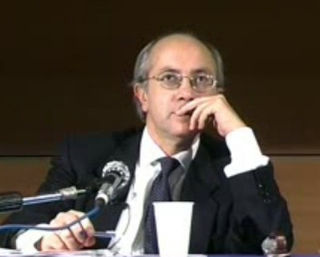Top 821 Roman Numerals Quotes & Sayings - Page 13
Explore popular Roman Numerals quotes.
Last updated on December 23, 2024.
From my student days I found him a compelling and fascinating, though often puzzling, figure. It's a lifelong fascination now and I don't expect that to stop! His vision of God, God's faithfulness, God's purposes and so on is so much bigger and richer than almost any subsequent Christian thinker has ever managed. In addition, I have always loved ancient history, especially the history of the early Roman empire, and of course Paul fits right into that.
The phrase you usually hear after a cut is "That was great. Perhaps we could have another go. Maybe try it this way." Even that much direction is prefaced with a lot of praise and encouragement. It's quite like how you deal with toddlers: positive reinforcement, and then a little suggestion that you might want to try something different. Roman Polanski will stop the take and shout, "No, no, no!" Which is somewhat alarming the first time it happens.
During a frustrating argument with a Roman Catholic cardinal, Napoleon Bonaparte supposedly burst out: “Your eminence, are you not aware that I have the power to destroy the Catholic Church?” The cardinal, the anecdote goes, responded ruefully: “Your majesty, we, the Catholic clergy, have done our best to destroy the church for the last 1,800 years. We have not succeeded, and neither will you.”
In a man like Friedrich von Schlegel the courage to be as an individual self produced complete neglect of participation, but it also produced, in reaction to the emptiness of this self-affirmation, the desire to return to a collective. Schlegel, and with him many extreme individualists in the last hundred years, became Roman Catholics. The courage to be as oneself broke down, and one turned to an institutional embodiment of the courage to be as a part.
The history of the Roman Empire is also the history of the uprising of the Empire of the Masses, who absorb and annul the directing minorities and put themselves in their place. Then, also, is produced the phenomenon of agglomeration, of "the full." For that reason, as Spengler has very well observed, it was necessary, just as in our day, to construct enormous buildings. The epoch of the masses is the epoch of the colossal.
When you become comfortable with uncertainty, infinite possibilities open up in your life. It means fear is no longer a dominant factor in what you do and no longer prevents you from taking action to initiate change. The Roman philosopher Tacitus rightly observed that 'the desire for safety stands against every great and noble enterprise.' If uncertainty is unacceptable to you, it turns into fear. If it is perfectly acceptable, it turns into aliveness, alertness and creativity.
To later Romans Ennius was the personification of the spirit of early Rome; by them he was called "The Father of Roman Poetry." We must remember how truly Greek he was in his point of view. He set the example for later Latin poetry by writing the first epic of Rome in Greek hexameter verses instead of in the old Saturnian verse. He made popular the doctrines of Euhemerus, and he was in general a champion of free thought and rationalism.
Grandfather's been dead all these years, but if you lifted my skull, by God, in the convolutions of my brain you'd find the big ridges of his thumbprint. He touched me. As I said earlier, he was a sculptor. 'I hate a Roman named Status Quo!' he said to me. 'Stuff your eyes with wonder,' he said, 'live as if you'd drop dead in ten seconds. See the world. It's more fantastic than any dream made or paid for in factories.
The form of religion was always a trivial matter to me. ... The pageantry of the Roman Church that first mothered and nurtured me touches me to this day. I love the Protestant prayers of the English Church. And I love the stern and knotty argument, the sermon with heads and sequences, of the New England Congregationalist. For this catholicity Catholics have upbraided me, churchmen rebuked me, and dissenters denied that I had any religion at all.
Malcolm Bradbury made the point, and I don't know whether it's a valid one or not, that the real English at the moment is not the English spoken in England or in America or even in Canada or Australia or New Zealand. The real English is the English which is a second language, so that it's rather like Latin in the days of the Roman Empire when people had their own languages, but had Latin in order to communicate.
There is one great fact, characteristic of this our nineteenth century, a fact which no party dares deny. On the one hand, there have started into life industrial and scientific forces which no epoch of former human history had ever suspected. On the other hand, there exist symptoms of decay, far surpassing the horrors recorded of the latter times of the Roman empire. In our days everything seems pregnant with its contrary.
That's why the virgin birth never gets rid of the human mother. The story only gets rid of the human father. So Jesus' life was the life of God nurtured through the Virgin Mary. That's because the virgin birth died as a literal story as soon as we discovered that women had an egg cell. It's interesting to watch what the Roman church did about that.
When we are going to enter the water ... in the presence of the congregation and under the hand of the president, we solemnly profess that we disown the devil, his pomp, and his angels. After this we are immersed three times, making a somewhat larger pledge than the Lord appointed in the Gospel. Then we are taken up [a reference to the Roman tradition of recognizing a newborn baby as a member of the family]. We first taste a mixture of milk and honey and from that day we refrain from the daily bath for a whole week.
Saint Teresa, as the Roman Rota attests, never fell into any mortal sin; but still Our Lord showed her the place prepared for her in Hell; not because she deserved Hell, but because, had she not risen from the state of lukewarmness in which she lived, she would in the end have lost the grace of God and been damned.
Judged by every standard which history has applied to Governments, the Soviet Government of Russia is one of the worst tyrannies that has ever existed in the world. It accords no political rights. It rules by terror. It punishes political opinions. It suppresses free speech. It tolerates no newspapers but its own. It persecutes Christianity with a zeal and a cunning never equalled since the times of the Roman Emperors. It is engaged at this moment in trampling down the peoples of Georgia and executing their leaders by hundreds.
The processes of secularization that followed in the wake of the Reformation continue to work themselves out in complicated ways, not only in Europe but also in North America. To make a very long and complex story short, the success of the Reformation combined with the persistence and renewal of Roman Catholicism in the 16th and 17th centuries made Christianity into an enduring, disruptive problem in new ways, layered on top of problems that already affected late medieval Christianity.
I would hope that wherever I go I bring good news - that's what that word means, right? It began with the first followers of Jesus taking a Roman military propaganda term and co-opting it for their own subversive purposes, insisting that the world isn't made better through coercive military violence but through sacrificial love. How great is that!? Unfortunately this word has been hijacked in several years for other purposes but no worries, we're taking it back.
This might explain why Obama gave billions to Wall Street crooks, and dragged the Iraq and Afghan wars on and on.
Happily for the busy lunatics who rule over us, we are permanently the United States of Amnesia. We learn nothing because we remember nothing... We have ceased to be a nation under law but instead a homeland where the withered Bill of Rights, like a dead trumpet vine, clings to our pseudo-Roman columns.
The first thing you notice about New Orleans are the burying grounds - the cemeteries - and they're a cold proposition, one of the best things there are here. Going by, you try to be as quiet as possible, better to let them sleep. Greek, Roman, sepulchres- palatial mausoleums made to order, phantomesque, signs and symbols of hidden decay - ghosts of women and men who have sinned and who've died and are now living in tombs. The past doesn't pass away so quickly here. You could be dead for a long time
One of our most important tasks will be to save future generations from a similar political fate and to maintain for ever watchful in them a knowledge of the menace of Jewry. For this reason alone it is vital that the Passion play be continued at Oberammergau; for never has the menace of Jewry been so convincingly portrayed as in this presentation of what happened in the times of the Romans. There one sees in Pontius Pilate a Roman racially and intellectually so superior, that he stands like a firm, clean rock in the middle of the whole muck and mire of Jewry.
......the interesting thing was that the Roman Catholic monks and the Buddhist monks had no trouble understanding each other. Each of them was seeking the same experience and knew that the experience was incommunicable. The communication is only an effort to bring the hearer to the edge of the abyss; it is a signpost, not the thing itself. But the secular clergy reads the communication and gets stuck with the letter, and that's where you have the conflict.
The early Christians' opponents all accepted that Jesus existed, taught, had disciples, worked miracles, and was put to death on a Roman cross. As in our day, debate and disagreement centred largely not on the story but on the significance of Jesus. Today nearly all historians, whether Christians or not, accept that Jesus existed and that the gospels contain plenty of valuable evidence which has to be weighed and assessed critically.
Thousands of experts study overbought indicators, oversold indicators,
head-and-shoulder patterns, put-call ratios, the Fed's policy on money supply, foreign investment, the movement of the constellations through the heavens, and the moss on oak trees, and they can't predict markets with any useful consistency, any more than the gizzard squeezers could tell the Roman emperors when the Huns would attack.
Monogamy, or restrictions by law to one wife, is no part of the economy of heaven among men. Such a system was commenced by the founders of the Roman Empire... Rome became the mistress of the world, and introduced this order of monogamy wherever her sway was acknowledged. Thus this monogamic order of marriage, so esteemed by modern Christians as a hold sacrament and divine institution, is nothing but a system established by a set of robbers.
We are born into this time and must bravely follow the path to the destined end. There is no other way. Our duty is to hold on to the lost position, without hope, without rescue, like that Roman soldier whose bones were found in front of a door in Pompeii, who, during the eruption of Vesuvius, died at his post because they forgot to relieve him. That is greatness. That is what it means to be a thoroughbred. The honorable end is the one thing that can not be taken from a man.
Golf acts as a corrective against sinful pride. I attribute the insane arrogance of the later Roman Emperors almost entirely to the fact that, never having played golf, they never knew that strange chastening humility which is engendered by a topped chip shot. If Cleopatra had been ousted in the first round of the Ladies' Singles, we should have heard a lot less of her proud imperiousness.
All play aspires to the condition of paradise...through play in all its forms...we hope to achieve a state that our larger Greco-Roman, Judeo- Christian culture has always known was lost. Where it exists, we do not know, although we always have envisioned it as a garden...always as removed, as an enclosed green place...Paradise is an ancient dream...It is a dream of ourselves as better than we are, back to what we were.
I think it's important to realise that what happens in Neo-Platonism beginning with Plotinus and Porphyry and then going on for the next several centuries, is a real kind of contest for the ideas and convictions of the intelligentsia of the later Roman Empire. So that you have Christians slowly converting more and more powerful people until of course actually Constantine and then other emperors after him, become Christian, and the empire becomes a Christian empire rather than Pagan empire.
As a military man who has given half a century of active service I say in all sincerity that the nuclear arms race has no military purpose. Wars cannot be fought with nuclear weapons. Their existence only adds to our perils because of the illusions they have generated. There are powerful voices around the world who still give credence to the old Roman precept - if you desire peace, prepare for war. This is absolute nuclear nonsense.
Nobody brings ancient history and archaeology to life like Adrienne Mayor. From the Russian steppes to China, and from Roman Egypt and Arabia to the Etruscans, she leads the reader on a breathtaking quest for the real ancient warrior women reflected in myths--their daring, archery, tattoos, fine horses, and independence from male control. The book's rich erudition, communicated in sparkling prose and beautiful illustrations, makes it a riveting read.
Goose pimples rose all over me, my hair stood on end, my eyes filled with tears of love and gratitude for this greatest of all conquerors of human misery and shame, and my breath came in little gasps. If I had not known that the Leader would have scorned such adulation, I might have fallen to my knees in unashamed worship, but instead I drew myself to attention, raised my arm in the eternal salute of the ancient Roman Legions and repeated the holy words, "Heil Hitler!"
Western Civilization has been in a state of decline since the Edwardian age, say 1910. That was the height of Greco-Roman European civilization. Then there was the First World War. That was the beginning of the end. That civilization has been in a decline ever since. But from the American triumphalist point of view our wonderful electronic revolution is really the forefront of an ongoing wonderful civilization.
If the churches ever did reunite, it would have to be into something that was as sacramental and liturgical and authoritative as the Roman Catholic Church and as protesting against abuses and as much focused on the individual in his direct relationship with Christ as the Evangelicals, as charismatic as the Pentecostals, as missionary-minded as the old mainline denominations, as focused on holiness as the Methodists or the Quakers, as committed to the social aspects of the Gospel as the social activists, as Biblical as fundamentalists, and as mystical as the Eastern Orthodox.
The interesting thing about that is one of the greatest critics of socialism and leftwing writings was Robert Michels who wrote a series of essays called "The Iron Law of Oligarchy" and in these essays he discusses how no matter what sorts of freedoms are advertised or put into a society structure, that all societies, all form of governments - whether they be a Roman republic, whether they be a democracy, whether they be a Russian communist system, whatever, a tribe... a tribal council - all of the continuously, throughout the ages, have all converted back into an oligarchy.
On areas like abortion where there is major disagreement among the mainstream religious groups in the Judeo-Christian tradition, I believe that requires a lot more caution. The Jewish position on abortion is very different from the Roman Catholic position. That is reason to be cautious about enacting laws rather than saying to the religious group: instruct your followers on these matters as matters of personal religious belief.
Jesus himself, and most of the message of the Gospels, is a message of service to the poor, a critique of the rich and the powerful, and a pacifist doctrine. And it remained that way, that's what Christianity was up... until Constantine. :Constantine shifted it so the cross, which was the symbol of persecution of somebody working for the poor, was put on the shield of the Roman Empire. It became the symbol for violence and oppression, and that's pretty much what the church has been until the present.
Some say they are not bound by the doctrine which teaches that the Mystical Body of Christ and the Roman Catholic Church are one and the same thing. Some reduce to a meaningless formula the necessity of belonging to the true Church in order to gain eternal salvation. Others finally belittle the reasonable character of the credibility of Christian Faith. These and like errors, it is clear, have crept in among certain of our sons who are deceived by imprudent zeal for souls or by false science.
When Paul was taken in chains from his filthy Roman dungeon and beheaded at the order of the opulent madman Nero, two representatives of humanity faced off, one of the best and one of the worst. One lived for prosperity on earth, the other didn’t. One now lives in prosperity in heaven, the other doesn’t. We remember both men for what they truly were, which is why we name our sons Paul and our dogs Nero.
Everything in New Orleans is a good idea. Bijou temple-type cottages and lyric cathedrals side by side. Houses and mansions, structures of wild grace. Italianate, Gothic, Romanesque, Greek Revival standing in a long line in the rain. Roman Catholic art. Sweeping front porches, turrets, cast-iron balconies, colonnades- 30-foot columns, gloriously beautiful- double pitched roofs, all the architecture of the whole wide world and it doesn't move.
I have a serious question." "I will give a serious answer." "Can a god be killed?" The humor drained from Roman's face. "Well, that depends on if you're a pantheist or a Marxist." "What's the difference?" "The first believes that divinity is the universe. The two are synonymous and nonexistent without each other. The second believes in anthropocentrism, seeing man in the center of the universe, and god as just an invention of human conscience. Of course, if you follow Nietzsche, you can kill God just by thinking about him.
Because Roman civilization perished through barbarian invasions, we are perhaps too much inclined to think that that is the only way a civilization can die. If the lights that guide us ever go out, they will fade little by little, as if of their own accord.... We therefore should not console ourselves by thinking that the barbarians are still a long way off. Some peoples may let the torch be snatched from their hands, but others stamp it out themselves.
I do think the Roman Catholic religion is a disease of the mind which has a particular epidemiology similar to that of a virus... Religion is a terrific meme. That's right. But that doesn't make it true and I care about what's true. Smallpox virus is a terrific virus. It does its job magnificently well. That doesn't mean that it's a good thing. It doesn't mean that I don't want to see it stamped out.
The fact is that philosophy has been a decisive source of inspiration in all the great crises that Europe has faced. It has been so in the time that preceded the fall of the Roman Empire, when Augustine of Hippo delineated the features of a new spiritual civilization; in the age of religious wars, when Descartes and Hobbes established the principles of modern science and politics; and at the turn of the French Revolution, interpreted by Kant and Hegel as an event destined to change the history of the world.
There's certainly an element of responsibility that goes with being on the cover of WWE 2K18, but I'm just stoked for it. I think it's awesome for our generation to have a guy on the cover who comes from the group of guys and girls on the road right now who are grinding it out every single day and night. I feel honored to have gotten the opportunity and that I was chosen to be that guy when it could have been anyone from Charlotte Flair to Sasha Banks to Roman Reigns.
My proposal is not that we understand what the word ‘god’ means and manage somehow to fit Jesus into that. Instead, I suggest that we think historically about a young Jew, possessed of a desperately risky, indeed apparently crazy, vocation, riding into Jerusalem in tears, denouncing the Temple, and dying on a Roman cross-and that we take our courage in both hands and allow our meaning for the word ‘god’ to be recentered around that point.
What little recognition the idea of obligation to the public obtains in modern morality, is derived from Greek and Roman sources, not from Christian; as, even in the morality of private life, whatever exists of magnanimity, high-mindeness, personal dignity, even the sense of honour, is derived from the purely human, not the religious part of our education, and never could have grown out of a standard of ethics in which the only worth, professedly recognized, is that of obedience.
Eloquence, when at its highest pitch, leaves little room for reason or reflection; but addressing itself entirely to the fancy or the affections, captivates the willing hearers, and subdues their understanding. Happily, this pitch it seldom attains. But what a Tully or a Demosthenes could scarcely effect over a Roman or Athenian audience, every Capuchin, every itinerant or stationary teacher can perform over the generality of mankind, and in a higher degree, by touching such gross and vulgar passions.
If we refuse our homage to statues and frigid images, the very counterpart of their dead originals, with which hawks, and mice, and spiders are so well acquainted, does it not merit praise instead of penalty [Christians were punished for not worshiping Roman gods] that we have rejected what we have come to see is error? We cannot surely be made out to injure those whom we are certain are nonentities. What does not exist is in its nonexistence secure from suffering.
I would that our farmers when they cut down a forest felt some of that awe which the old Romans did when they came to thin, or letin the light to, a consecrated grove (lucum conlucare), that is, would believe that it is sacred to some god. The Roman made an expiatory offering, and prayed, Whatever god or goddess thou art to whom this grove is sacred, be propitious to me, my family, and children, etc.
Books have survived television, radio, talking pictures, circulars (early magazines), dailies (early newspapers), Punch and Judy shows, and Shakespeare's plays. They have survived World War II, the Hundred Years' War, the Black Death, and the fall of the Roman Empire. They even survived the Dark Ages, when almost no one could read and each book had to be copied by hand. They aren't going to be killed off by the Internet.
Out of the chaos of post-Roman Dark Age Britain, the English had created the world's first nation-state: One king, one country, one church, one currency, one language and a single unified representative national administration. Never again in England would sovereignty descend to the merely regional level. Never again would the idea of England and the unity of England ever be challenged.
New York doesn't exactly have neighborhoods, the way most cities do. What it has is closer to distinct and separate villages, some of them existing on different continents, some of them existing in different centuries, and many of them at war with one another. English is not the primary language in many of these villages, but the Roman alphabet does still have a slight edge.
I think there's no question that historians create; they would tell you that, I think. If I'm trying to imagine an imperial Roman position, it's much easier to imagine the poor schlub who's not even sure why he's doing what he's doing than it is to imagine Caesar. At least for me. And I'm intrigued, too, by the position of the poor schlub who *still* finds himself supporting the imperial project.
I read somewhere that if you translated all the gadgets and technology in our houses to make our lives easier and save time, each of us would have the equivalent of 300 slaves, in Roman times. We have these incredible luxuries, incredible power and privileges, but we seem to be squandering them on little plastic spoons to stir our coffee with, that'll last two seconds in our lives.
The nations, and the sects, of the Roman world, admitted with equal credulity, and similar abhorrence, the reality of that infernal art [witchcraft], which was able to control the eternal order of the planets, and the voluntary operations of the human mind. . . . They believed, with the wildest inconsistency, that this preternatural dominion of the air, of earth, and of hell, was exercised, from the vilest motives of malice or gain, by some wrinkled hags and itinerant sorcerers, who passed their obscure lives in penury and contempt.
There is no way to have a real relationship without becoming vulnerable to hurt. Christmas tells us that God became breakable and fragile. God became someone we could hurt. Why? To get us back... No other religion-whethe r secularism, Greco-Roman paganism, Eastern religion, Judaism, or Islam-believes God became breakable or suffered or had a body.
At the bidding of a Peter the Hermit millions of men hurled themselves against the East; the words of an hallucinated enthusiast such as Mahomet created a force capable of triumphing over the Graeco-Roman world; an obscure monk like Luther bathed Europe in blood. The voice of a Galileo or a Newton will never have the least echo among the masses. The inventors of genius hasten the march of civilization. The fanatics and the hallucinated create history.
As the Roman Empire came to its close, all the old gods of the pagan world were seen as demons by the Christians who rose. It was useless to tell them as the centuries passed that their Christ was but another God of the Wood, dying and rising, as Dionysus or Osiris had done before him, and that the Virgin Mary was in fact the Good Mother again enshrined. Theirs was a new age of belief and conviction, and in it we became devils, detached from what they believed, as old knowledge was forgotten or misunderstood.
























































